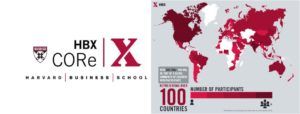HBX – Disrupting the Business Education Delivery Model

Analysing Harvard Business School's revolutionary initiatives to impart high quality business education using cutting edge digital technologies.
MOOCs – First steps towards a digital education revolution?
Over the last few years, digitization has been transforming education with Massive Open Online Courses (MOOCs) making educational content widely available to anyone with an internet connection.
It is estimated that currently 4000+ MOOCs are offered by 500+ global universities and that last year ~35 million students signed up for at least one of them. However, the quality of the MOOC experiences (available on Coursera, Udacity, edX etc.) has been constantly questioned as class sizes are in thousands and students receive minimal personal interaction from the academicians. Furthermore, it is estimated that the average completion rate for MOOCs is less than 7 per cent.
HBX – A Disruptive and Transformational Initiative
In June 2014, HBS launched the digital HBX Initiative, starting with the CORe offering (three courses — Economics for Managers, Business Analytics, and Financial Accounting). Initially intended as a pre-MBA package for incoming students without a business background, during the development phase the team realized that CORe could potentially be further monetized by expanding the target audience to young professionals looking to progress their business careers.
The 11-week online CORe program (currently priced at USD 1800) imparts knowledge on essential business fundamentals through short 3 – 5 minute case based videos. Videos are immediately followed by questions that mimic the HBS “cold call” method. Currently acceptance to the CORe program is through a selective application process meant to build a cohort of ~400 students. Students create profiles on the platform and actively engage with peers on discussion boards. Greater than 85% course completion rate has been observed with the cohorts and candidates receive a hard copy certificate with grades on passing. While a certificate of completion gained from a class on Coursera wasn’t seen as extremely valuable, candidates of the HBX program are reporting that hiring managers seem a lot more curious and impressed to learn about the HBX Certificate.
HBX Live – Class, Show or Both?
For years, colleges and universities have been trying to model the high tech classrooms of the future. But no one has undertaken either the expense or the ambition to uniquely recreate a classroom to teach 50+ people in real time, with no lag in voice or image, no matter where they are located in the world—and to do it with the same spirit and energy as seen in an animated case discussion. That is, no one until Harvard Business School.
After three full years of planning and building a unique virtual space, in August 2015, HBS launched HBX Live – a virtual classroom designed to reproduce the intimacy and synchronous interaction of Harvard Business School’s famed case study method.
The HBX Live studio is a custom-designed studio, featuring a high-resolution video wall mimicking the amphitheater-style seating of an HBS classroom, where up to 60 participants are displayed on individual screens simultaneously. But achieving this goal has been complex – during the development phase, most technology experts felt that the futuristic classroom design could support a maximum of 15-20 people. A significant initial challenge was latency, the typical delay built into audio and video that is streamed over the Internet. Constant pushbacks to inadequate solutions led to continuous product innovation. Ultimately high quality video and audio feeds, digital black boards, e-polling and real time chat features has enabled candidates to immerse themselves into an ‘HBS like’ case learning experience. To enable access to such a learning environment despite the physical distances between candidates and challenges of internet technologies is a game changer for the digital delivery of business education.
Next Steps
Having personally experienced both the HBX Core and Live platforms, I firmly believe these are revolutionary and disruptive offerings, years ahead of anything on the market. Although still in a nascent stage, one thing is clear – HBS has the strongest of launch pads to work from and just needs to decide when and to what extend it would like to scale up these digital offerings to change the market dynamics for top quality business education. Going forward I would like to see HBS taking the following initiatives:
- Scale up their business model by setting up additional virtual classrooms. HBX Live can be further monetized by engaging with corporates and other global business schools wanting to expose their top candidates to the HBS learning experience.
- Launch an entire portfolio of executive education offerings, or even an accelerated online MBA that would not compete with its more expansive, two-year, full-time residential program.
- HBS can even use the HBX Live environment to bring together and engage leading business leaders on key global issues. This will serve as a rich learning experience for an HBS audience (academicians, students and alumni) as the school strives towards its vision of educating leaders that make a difference in the world.
(799 Words)
Sources:
- http://www.hbs.edu/news/releases/Pages/hbx-live.aspx
- http://hbx.hbs.edu/hbx-live
- http://www.hbxblog.com/topic/hbx-live
- http://www.businessinsider.com/harvard-business-school-hbx-1500-online-program-2015-2
- http://www.innovation-prime.com/how-is-personalized-learning-transforming-education/
- http://poetsandquants.com/2015/08/25/harvard-business-schools-classroom-of-the-future/
- https://www.timeshighereducation.com/features/massive-open-online-courses-moocs-can-transform-education-but-not-yet






I have two general concerns with schools making the push towards online education and MOOCs. First is that I think making a school’s courses and materials so readily available and accessible dilutes its brand. [1] Why am I paying $100k a year to attend HBS, MIT, etc. when I can take many of their classes online for a much lower cost (or free in many instances)? Per the article below, I think there is a disconnect as consumers who haven’t tried either product (the online or the in person class) might not understand what the real difference is between the two, and what the value of the in person experience is. Secondly, as many people say, the real value of business school and HBS is not what you learn in class, but who you meet and the relationships you build. I assume that would be practically nonexistent in an HBX Live curriculum. If it’s just about learning the materials, I think you would be indifferent between taking a class via HBX, Coursera, Edx, etc. What we learn in our finance classes is not fundamentally different from what you would learn at another school, and if anything I think the case method fall short in actually teaching the material itself so I’m not sure I’d want to learn accounting or marketing via HBX Live—you’d probably learn a lot more watching a more traditional finance class.
[1] http://www.npr.org/2012/07/02/156122748/online-classes-cut-costs-but-do-they-dilute-brands
Interesting post Nikhil. While I agree HBS is definitely a front-runner when it comes to a sophisticated online platform I do have two reservations with regards to this program. First, while you say that they are years ahead of the competition, I would actually argue that HBS in terms of technology does not have a true long-term sustainable competitive advantage. For instance, IE Business School in Madrid has a fully online MBA program (ranked #1 in the world [1]), which has similar features to the HBX program [2]. In addition, I would be worried for HBS to dilute its brand reputation. While the Harvard brand name is so extremely powerful and will very likely remain so in the long future, the more courses such as summer courses, online courses etc. for which the entry barrier is not nearly as high as the full-time version, it does run the risk that over time employers put less value on the Harvard brand name as alumni quality has become too varied.
[1] http://rankings.ft.com/businessschoolrankings/online-mba-ranking-2016
[2] http://www.ie.edu/business-school/degrees/global-mba/program/
Nikhil, I definitely agree that MOOCs are in and will continue to disrupt the education industry. By adopting the HBX platform, Harvard is essentially saying it is willing to cannibalize its own conventional classroom-based service offering for students who do not value the other aspects of the on-campus experience. That said there will be key differentiation in the service offering, just to name a few: (1) relationship with peers, alums and faculty and (2) coursework that requires the team or in-person interactions e.g. negotiations or Shad sweatshop exercise. Eventually the job market will be the one to decide if the MOOC education can substitute the 2-year full-time MBA experience.
If I had to compare the HBX experience to a regular HBS RC class, I would be amazed by the similarities in tackling the case method as a learning tool. Still, there is much more that HBS has to offer in terms of team and relationship building through collaboration that what HBX has not provided until now [1]. Study groups, after class discussions and team activities are just a few examples of the hollistic learning experience you get from HBS and it is intriguing, to see how these components will develop in an online and remote setting: will this just be a next stage of education Digital Transformation?
[1] https://hbr.org/2015/04/what-harvard-business-school-has-learned-about-online-collaboration-from-hbx
Thanks for the insightful post Nikhil. I think online business education is a growing and important space and I am excited to see that HBS has extended its offerings online to a broader community. Today, many young people lack business acumen. Based on a 2013 survey from Barclays and charity pfeg, “under 25s are showing worrying gaps in their financial knowledge relating to bank statements, overdrafts and interest on loans.” It is critical for our economy that this gap is bridged and I think that online business courses such as HBX has the power to do this. While there is fear that HBX will dilute the HBS brand, I hope that the public will see the value in the HBX offering and that other prestigious institutions will follow in Harvard’s footsteps making it an industry standard.
http://www.telegraph.co.uk/finance/personalfinance/10092294/Young-people-lack-financial-skills.html
Nikhil, great post! I very much agree with your suggestions. Having researched the same topic, I think it’s critical for HBS to use these revolutionary technologies (that build off of their competitive advantage: the case method classroom and HBS legacy) to strictly COMPLIMENT their current offerings. It would be detrimental for them to make a massive MOOC play. This would call into question the value of their traditional MBA program and Executive Education program which are huge money-makers and valued so pricey for their in-person experience. If we begin to say that you can experience everything through HBX the same way you would a live class, we call into question the value of our core product and begin to disrupt our own market, the same way MIT with an online MBA or the MOOC world of Coursera has begin to threaten our underlying value. Right now I think our brand and presumed added value are too strong to be threatened by any sense of online courses. However, if we build technology that truly could threaten it, and market it too broadly, and as a “free service”, this gets dicey. I like your suggestions to build out an accelerated online MBA program, perhaps for international folks only, and with a final trip to HBS for exams or FIELD. Or to take the program one-step further removed and utilize the platform for social good. To make a big splash by coordinating summits or sessions with world leaders and thinkers. This is great for disruption, future planning, and the HBS brand. Hadn’t thought of that application and firmly believe it could work and even be monetized. Well done.